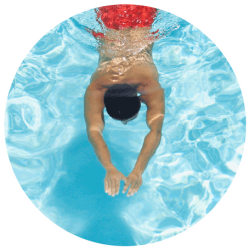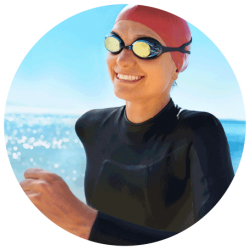Is it safe to swim with contacts?
If you ask an eye doctor if swimming with contacts is safe, you will likely get a resounding “No”.
Water is a natural home for microorganisms and bacteria. This is true of water found in swimming pools, lakes, streams, oceans, hot tubs and even tap water. These microbes are around us at all times and the body’s defense systems will normally allow us to come in contact with them without suffering any ill effects. Having a contact lens on the eye, however, creates a breach in our body’s normal ability to defend itself.
Why is water bad for contact lenses?
Contact lenses are like tiny sponges that absorb anything they are exposed to. When a contact lens comes into contact with water, the water is absorbed into the lens and is trapped against the eye, allowing the microbes in the water to attack the surface of the eye. The eye’s normal defense system is to blink away these microbes as our tears help to flush them out. With a contact lens on the eye, the bugs can hide under the contact lens, protected from our blinking and tears.
Acanthamoeba Keratitis
Lakes, ponds, rivers and oceans tend to contain more naturally occurring microorganisms that can lead to eye infections. Chemicals found in swimming pools and hot tubs can create additional irritation to the eyes that allows opportunistic bugs to infect them. Even treated and filtered tap water often contains a bug called Acanthamoeba that can cause a painful and sight threatening eye infection.
This type of infection is called acanthamoeba keratitis. It is difficult to treat and can lead to rapid scarring of the cornea causing vision loss. This is why you should never rinse a contact lens in tap water or shower with contact lenses.
Other water related issues
Aside from the risk of infection, exposure to water and the chemicals in it can cause other contact lens related issues. Water will cause the contact lens to swell, making it less comfortable on the eye. Water can wash away the normal tear film and its natural lubricating properties, which can make your eyes feel drier.
The chemicals in swimming pools and hot tubs, particularly chlorine, can cause the conjunctival tissue of your eye to get red, swollen and inflamed. Salt from salt water pools and the ocean can also irritate the eye surface. There is also a risk of losing your contact lenses when swimming or showering if the water flushes them out.
What if I still want to swim with contact lenses?
It is probably unrealistic to believe that no one will ever swim or shower in contact lenses again. If you do decide to swim with contacts, there are some precautions you can take to reduce your risk of complications. If you swim frequently and need your contacts lenses to be able to see, your safest option is to use daily disposables and to throw them away after swimming.
If you wear 2-week disposable or monthly disposable lenses and you occasionally swim with them, it still is best to throw them away after swimming and put in new lenses. If this is not possible, be sure to clean and disinfect the lenses with a quality multi-purpose contact lens solution before reusing them. Swimming in contacts and then sleeping in them is a particularly dangerous combination and significantly increases the risk of infection.
Wear good goggles
You can reduce the amount of exposure to contaminants in water by wearing a good quality pair of swim goggles over your contact lenses. Wearing goggles while swimming is recommended even if you wear daily disposable lenses. The goggles should fit snuggly against your eyes without leaking.
Prescription goggles
There are many options in prescription powered swim goggles that are a much safer alternative to swimming in contact lenses. Prescription swim goggles are available with lenses that have UV protection to shield your eyes from the harmful effect of the sun if you swim outside a lot. The prescription ranges for swim goggles may be limited if you have a more complex prescription.
Other potential options
For people who are competitive swimmers, triathletes, lifeguards, surfers or others who are always in the water, it may be worth considering options other than contact lenses to correct your vision and reduce the risk of infection. These options include refractive surgery such as LASIK or PRK, or corneal reshaping using orthokeratology. Orthokeratology uses hard gas permeable contact lenses to change the shape of the front of your eye without surgery.
What if I have problems after swimming with contact lenses?
If you experience any redness, pain, irritation, light sensitivity, unusual discharge, or blurred vision after swimming with contact lenses, this could be the sign of an eye infection. If you have any of these symptoms, remove the contact lenses right away. If the symptoms persist for more than a few hours, contact your eye doctor immediately. Be sure to tell your eye doctor that your symptoms may be related to swimming in contact lenses.
In summary, it is always best to remove your contact lenses before swimming, playing in the water or showering. If you do swim with contacts, wear swim goggles over the lenses and throw them away when you’re done. If you have any problems after swimming, contact your eye doctor as soon as possible.
Todd Childs, O.D. has been practicing optometry for the past twelve years. He currently practices at South Valley Optical in Draper, Utah. Dr. Childs earned his Doctor of Optometry at Southern California College of Optometry.
is Doctor of Optometry at Southern California College of Optometry.















